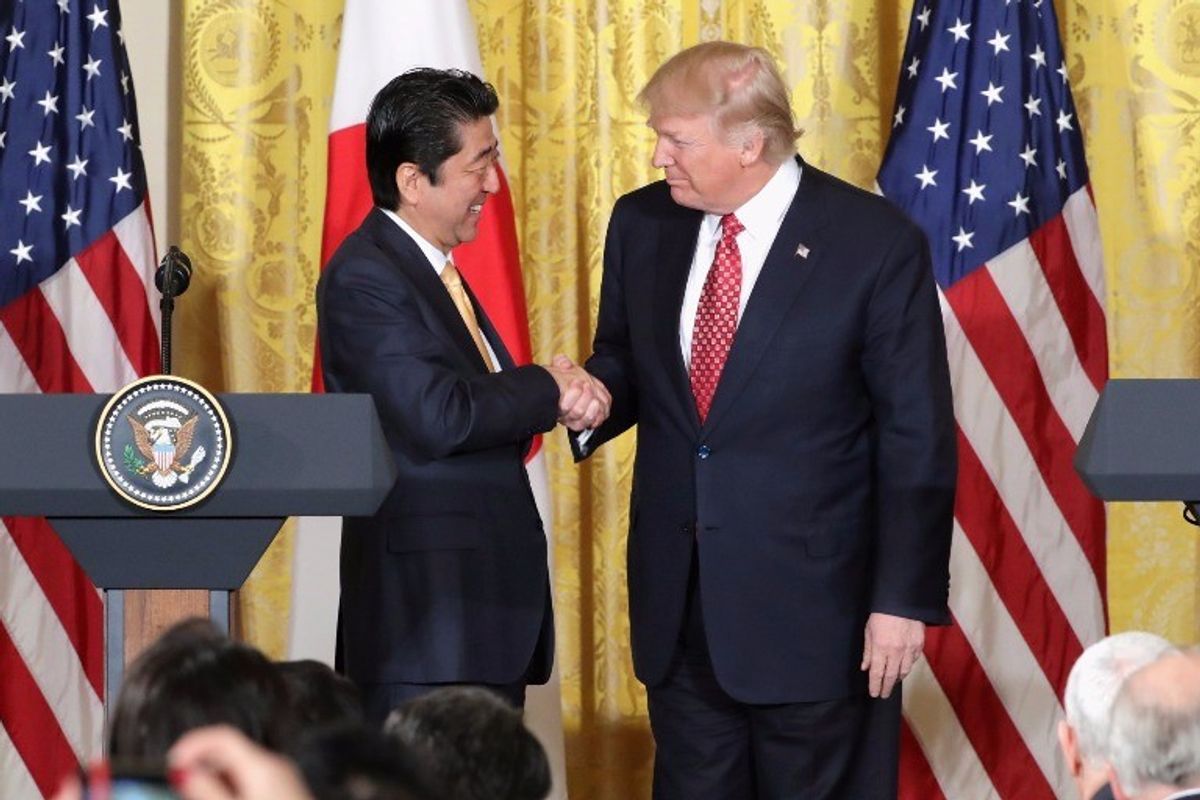Japanese Prime Minister Shinzo Abe’s current political problems obscure the striking speed with which he successfully tackled thorny and long-standing security policy problems, including the lifting of the country’s arms export ban. In very short order, Abe adjusted Japan’s security institutions, selectively enhanced its military power, and diversified its strategic partnerships, all while committing even more fully to the U.S. alliance relationship. His government reached out to establish a range of new security partnerships beyond the alliance – creation of near-peer partnerships with India and Australia, capacity-strengthening overtures to ASEAN states, intelligence-based cooperation with South Korea, and, in arguably its boldest initiative, even an attempt to neutralize the most threatening peer competitor, China, by finding common ground with Russia. After the populist electoral revolutions in Britain and the United States in 2016, he and Angela Merkel stood nearly alone as champions of open markets and free trade.
Many of the items on Abe’s long list for security policy reform were inherited from an era in which even conservative Japanese governments found it more advantageous to tie their own hands and lash themselves to the pacifist post of Article 9 of the Japanese Constitution than to adopt policies that could be used by political opponents to connect them to World War II-era militarism. The United States was all too eager to underwrite Japan’s cheap ride with troops, markets, and technology. Consequently, Japan lived far longer than necessary with self-imposed constraints on its defense budget, limits on the use of force and collective self-defense, and a ban on exports of defense equipment.
Abe was determined to change all that. His creation of the National Security Council in 2013 was the most ambitious reorganization of Japan’s foreign and security policy apparatus since the end of World War II. Aiming to create a strategic headquarters to produce better-protected intelligence and a better-coordinated grand strategy across a divisive bureaucracy and political class, the NSC is designed to upgrade intelligence capabilities and centralize security policymaking – essential moves if Japan is ever to resolve the inherent tension between its desire to enhance alliance management and to reduce dependence on the United States.
Expanding trade in the defense sector was near the top of Abe’s list of desired changes. Japan’s defense industry had long been capable of producing world-class military products, but it was hobbled by self-imposed restrictions on exports and by limited domestic defense budgets. The result was a stunted defense industrial base and overpriced domestic equipment in an era when procurement budgets were either flat or declining. The naval shipbuilding industry had to be consolidated through mergers, the number of shipyards was cut nearly in half, and smaller firms exited the defense business altogether.
Thus, lifting the self-imposed ban on the export of military equipment – the “Three Principles on Arms Exports” – a four-decade-long fixture of Japan’s postwar pacifism, was greeted warmly by industry. Indeed, Japan’s defense industry had long sought this change, but had kept its advocacy low key, given justifiable concerns that the Japanese public would reject the prospect of their becoming “merchants of death.”
By the 2010s, it was clear to everyone that Japan’s strategic environment had shifted. Japan’s GDP was roughly twice that of China’s in 2005, but the Chinese economy would soon grow to more than 2½ times that of Japan’s. These sharply differential economic growth rates impinged directly on Japanese security, as Chinese defense budgets grew in real terms by hundreds of percent, while Japan’s were flat. At the same time, the Japanese defense industry’s problems were intensifying, as maintenance costs ate up an increasingly large share of the defense budget. Moreover, while other medium-sized military powers turned to international collaboration to offset ever-growing development costs and limited procurement scale, Japan was blocked from such cooperation by the nation’s ban on arms exports.
So, pushing on a partially opened door, the Abe Cabinet framed the elimination of restraints primarily as a way for Japanese defense contractors to break into joint development and co-production projects with foreign partners. Joint development and production agreements with U.S. partners had periodically been approved even prior to the lifting of the arms export ban, but lifting it opened the door to collaboration with firms from other states. With more defense procurement options available, Tokyo may also believe that lifting the arms export ban will give it more leverage in negotiations with the United States. The public has remained unenthusiastic, but in the context of a rising China – and amid concern about a United States in relative decline – “international armament cooperation” was accepted with no major protests.
Japanese defense contractors immediately negotiated sales of components: a new suspension system designed for the Bradley fighting vehicle, sensors to the United States, and tank technology to Turkey. It has agreed to jointly develop new air-to-air missile interceptors with the UK and is seeking to develop a variety of autonomous systems with France. Having scored some limited successes with components, Japanese attention soon shifted to the export of complex weapons platforms – systems such as US-2 amphibious planes to India, C-2 transport aircraft to Southeast Asian militaries, and the failed deal to sell Soryu-class submarines to Australia.
The export of full systems, however, has proven too ambitious. The Australia submarine bid seemed to have just the right workshare balance – U.S. command-and-control technology with Japanese propulsion and frame – and fit well with allied efforts to signal resolve to China. The Australians did not see it that way, though, and rejected the Japanese offer, opting instead for a French submarine. India, meanwhile, continues to balk at the unit cost of the US-2s and is demanding more technology transfer than the Japanese manufacturer is comfortable providing.
Japanese defense contractors have yet to sell a major military system. Japan is trying to sell its P-1 aircraft to the U.K., New Zealand, Thailand, and other states, but one of the two patrol planes to be showcased at the Paris Air Show last month was grounded while en route in Djibouti. Even with the creation of a new Acquisition, Technology and Logistics Agency, and efforts to hone marketing, technology transfer, and other capabilities, it is not at all clear whether the Japanese defense industry is ready for prime time in a very competitive global marketplace.
A related question – perhaps the only one the Trump Administration should care about – is whether or not a thriving Japanese defense industry will help or hurt U.S. policy in the Asia-Pacific. The answer is that this will depend on four factors. First and most important, will Japan’s improved defense cooperation improve Japanese defense capabilities? Second, will it improve the defense capability of other partners? Third, will Japanese manufacturers displace sales by U.S. firms (possibly with systems that incorporate U.S. technology)? Fourth, will it improve or undermine the future interoperability of U.S. and Japanese forces? Future efforts – such as the reported project by Japanese and U.S. defense contractors to co-develop new ground-based radars for Japan’s ballistic missile defense and for export (the so-called Aegis Ashore) – should be measured against these interests.
Defense cooperation has the potential to reduce unit costs and improve Japanese defense capabilities and interoperability without damaging U.S. industry, but there is no guarantee this will happen. Over several decades during the Cold War, Japanese bureaucrats and industry leaders developed a troubling tendency to see defense production largely as a tool for indigenizing foreign technology. Ultimately, the answer to all four questions above – and whether reform carries positive implications for U.S. interests – depends largely on whether officials in Tokyo truly focus on meeting the defense requirements that flow from an increasingly challenging international environment, or whether mercantile impulses prove too ingrained and powerful to resist.













